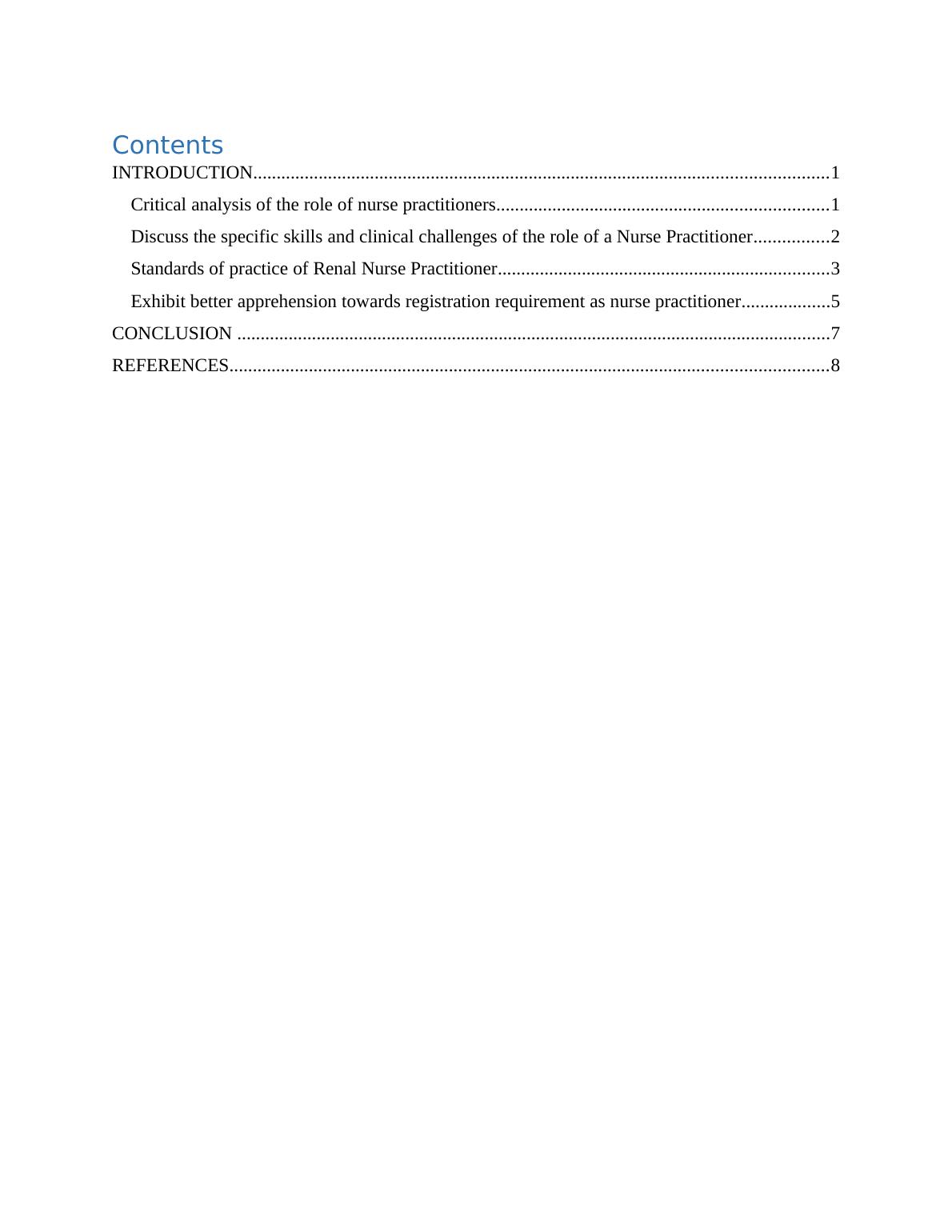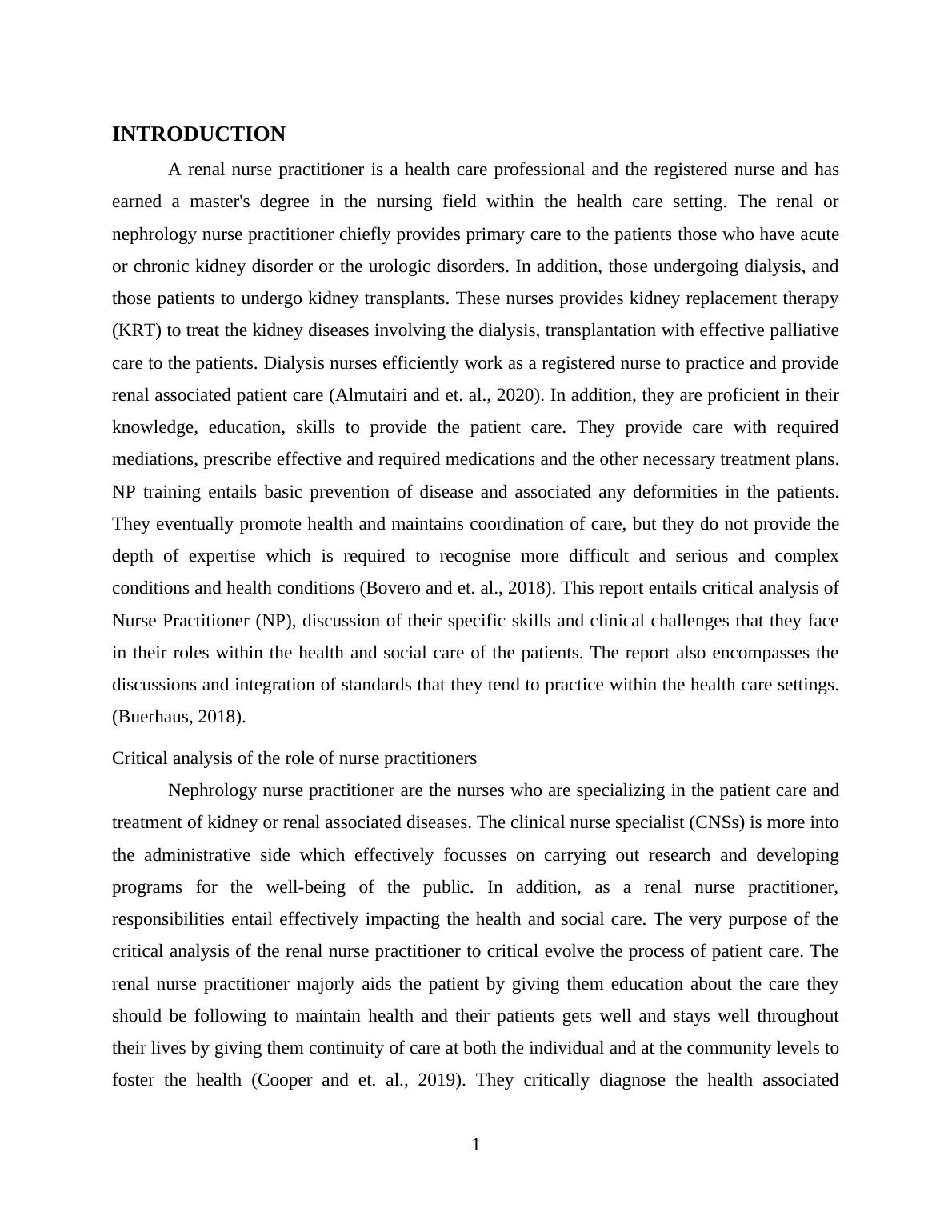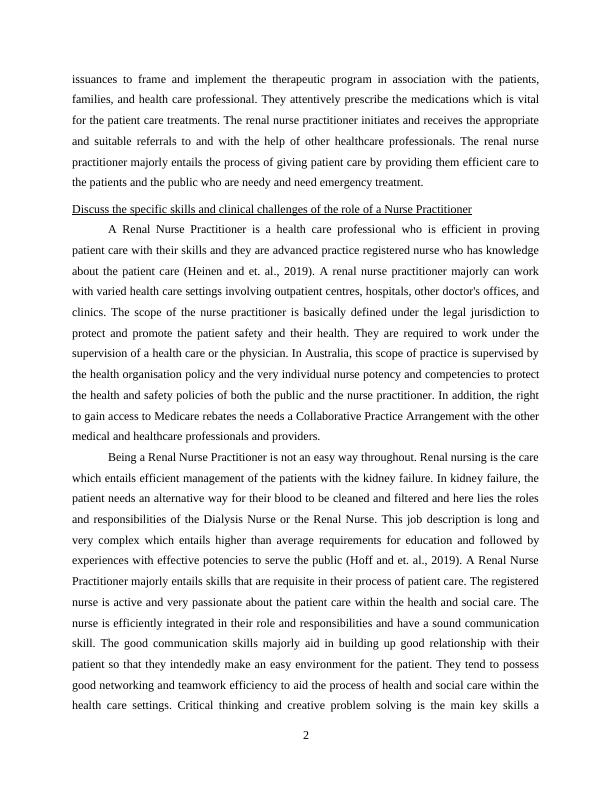Role of Nurse Practitioners in Renal Care: Skills, Challenges and Standards
11 Pages3737 Words81 Views
Added on 2023-06-05
About This Document
This report discusses the role of nurse practitioners in renal care, including their specific skills, clinical challenges, and standards of practice. It also covers the registration requirements for nurse practitioners and their importance in the healthcare setting.
Role of Nurse Practitioners in Renal Care: Skills, Challenges and Standards
Added on 2023-06-05
ShareRelated Documents
GCN Nursing knowledge

Contents
INTRODUCTION...........................................................................................................................1
Critical analysis of the role of nurse practitioners.......................................................................1
Discuss the specific skills and clinical challenges of the role of a Nurse Practitioner................2
Standards of practice of Renal Nurse Practitioner.......................................................................3
Exhibit better apprehension towards registration requirement as nurse practitioner...................5
CONCLUSION ...............................................................................................................................7
REFERENCES................................................................................................................................8
INTRODUCTION...........................................................................................................................1
Critical analysis of the role of nurse practitioners.......................................................................1
Discuss the specific skills and clinical challenges of the role of a Nurse Practitioner................2
Standards of practice of Renal Nurse Practitioner.......................................................................3
Exhibit better apprehension towards registration requirement as nurse practitioner...................5
CONCLUSION ...............................................................................................................................7
REFERENCES................................................................................................................................8

INTRODUCTION
A renal nurse practitioner is a health care professional and the registered nurse and has
earned a master's degree in the nursing field within the health care setting. The renal or
nephrology nurse practitioner chiefly provides primary care to the patients those who have acute
or chronic kidney disorder or the urologic disorders. In addition, those undergoing dialysis, and
those patients to undergo kidney transplants. These nurses provides kidney replacement therapy
(KRT) to treat the kidney diseases involving the dialysis, transplantation with effective palliative
care to the patients. Dialysis nurses efficiently work as a registered nurse to practice and provide
renal associated patient care (Almutairi and et. al., 2020). In addition, they are proficient in their
knowledge, education, skills to provide the patient care. They provide care with required
mediations, prescribe effective and required medications and the other necessary treatment plans.
NP training entails basic prevention of disease and associated any deformities in the patients.
They eventually promote health and maintains coordination of care, but they do not provide the
depth of expertise which is required to recognise more difficult and serious and complex
conditions and health conditions (Bovero and et. al., 2018). This report entails critical analysis of
Nurse Practitioner (NP), discussion of their specific skills and clinical challenges that they face
in their roles within the health and social care of the patients. The report also encompasses the
discussions and integration of standards that they tend to practice within the health care settings.
(Buerhaus, 2018).
Critical analysis of the role of nurse practitioners
Nephrology nurse practitioner are the nurses who are specializing in the patient care and
treatment of kidney or renal associated diseases. The clinical nurse specialist (CNSs) is more into
the administrative side which effectively focusses on carrying out research and developing
programs for the well-being of the public. In addition, as a renal nurse practitioner,
responsibilities entail effectively impacting the health and social care. The very purpose of the
critical analysis of the renal nurse practitioner to critical evolve the process of patient care. The
renal nurse practitioner majorly aids the patient by giving them education about the care they
should be following to maintain health and their patients gets well and stays well throughout
their lives by giving them continuity of care at both the individual and at the community levels to
foster the health (Cooper and et. al., 2019). They critically diagnose the health associated
1
A renal nurse practitioner is a health care professional and the registered nurse and has
earned a master's degree in the nursing field within the health care setting. The renal or
nephrology nurse practitioner chiefly provides primary care to the patients those who have acute
or chronic kidney disorder or the urologic disorders. In addition, those undergoing dialysis, and
those patients to undergo kidney transplants. These nurses provides kidney replacement therapy
(KRT) to treat the kidney diseases involving the dialysis, transplantation with effective palliative
care to the patients. Dialysis nurses efficiently work as a registered nurse to practice and provide
renal associated patient care (Almutairi and et. al., 2020). In addition, they are proficient in their
knowledge, education, skills to provide the patient care. They provide care with required
mediations, prescribe effective and required medications and the other necessary treatment plans.
NP training entails basic prevention of disease and associated any deformities in the patients.
They eventually promote health and maintains coordination of care, but they do not provide the
depth of expertise which is required to recognise more difficult and serious and complex
conditions and health conditions (Bovero and et. al., 2018). This report entails critical analysis of
Nurse Practitioner (NP), discussion of their specific skills and clinical challenges that they face
in their roles within the health and social care of the patients. The report also encompasses the
discussions and integration of standards that they tend to practice within the health care settings.
(Buerhaus, 2018).
Critical analysis of the role of nurse practitioners
Nephrology nurse practitioner are the nurses who are specializing in the patient care and
treatment of kidney or renal associated diseases. The clinical nurse specialist (CNSs) is more into
the administrative side which effectively focusses on carrying out research and developing
programs for the well-being of the public. In addition, as a renal nurse practitioner,
responsibilities entail effectively impacting the health and social care. The very purpose of the
critical analysis of the renal nurse practitioner to critical evolve the process of patient care. The
renal nurse practitioner majorly aids the patient by giving them education about the care they
should be following to maintain health and their patients gets well and stays well throughout
their lives by giving them continuity of care at both the individual and at the community levels to
foster the health (Cooper and et. al., 2019). They critically diagnose the health associated
1

issuances to frame and implement the therapeutic program in association with the patients,
families, and health care professional. They attentively prescribe the medications which is vital
for the patient care treatments. The renal nurse practitioner initiates and receives the appropriate
and suitable referrals to and with the help of other healthcare professionals. The renal nurse
practitioner majorly entails the process of giving patient care by providing them efficient care to
the patients and the public who are needy and need emergency treatment.
Discuss the specific skills and clinical challenges of the role of a Nurse Practitioner
A Renal Nurse Practitioner is a health care professional who is efficient in proving
patient care with their skills and they are advanced practice registered nurse who has knowledge
about the patient care (Heinen and et. al., 2019). A renal nurse practitioner majorly can work
with varied health care settings involving outpatient centres, hospitals, other doctor's offices, and
clinics. The scope of the nurse practitioner is basically defined under the legal jurisdiction to
protect and promote the patient safety and their health. They are required to work under the
supervision of a health care or the physician. In Australia, this scope of practice is supervised by
the health organisation policy and the very individual nurse potency and competencies to protect
the health and safety policies of both the public and the nurse practitioner. In addition, the right
to gain access to Medicare rebates the needs a Collaborative Practice Arrangement with the other
medical and healthcare professionals and providers.
Being a Renal Nurse Practitioner is not an easy way throughout. Renal nursing is the care
which entails efficient management of the patients with the kidney failure. In kidney failure, the
patient needs an alternative way for their blood to be cleaned and filtered and here lies the roles
and responsibilities of the Dialysis Nurse or the Renal Nurse. This job description is long and
very complex which entails higher than average requirements for education and followed by
experiences with effective potencies to serve the public (Hoff and et. al., 2019). A Renal Nurse
Practitioner majorly entails skills that are requisite in their process of patient care. The registered
nurse is active and very passionate about the patient care within the health and social care. The
nurse is efficiently integrated in their role and responsibilities and have a sound communication
skill. The good communication skills majorly aid in building up good relationship with their
patient so that they intendedly make an easy environment for the patient. They tend to possess
good networking and teamwork efficiency to aid the process of health and social care within the
health care settings. Critical thinking and creative problem solving is the main key skills a
2
families, and health care professional. They attentively prescribe the medications which is vital
for the patient care treatments. The renal nurse practitioner initiates and receives the appropriate
and suitable referrals to and with the help of other healthcare professionals. The renal nurse
practitioner majorly entails the process of giving patient care by providing them efficient care to
the patients and the public who are needy and need emergency treatment.
Discuss the specific skills and clinical challenges of the role of a Nurse Practitioner
A Renal Nurse Practitioner is a health care professional who is efficient in proving
patient care with their skills and they are advanced practice registered nurse who has knowledge
about the patient care (Heinen and et. al., 2019). A renal nurse practitioner majorly can work
with varied health care settings involving outpatient centres, hospitals, other doctor's offices, and
clinics. The scope of the nurse practitioner is basically defined under the legal jurisdiction to
protect and promote the patient safety and their health. They are required to work under the
supervision of a health care or the physician. In Australia, this scope of practice is supervised by
the health organisation policy and the very individual nurse potency and competencies to protect
the health and safety policies of both the public and the nurse practitioner. In addition, the right
to gain access to Medicare rebates the needs a Collaborative Practice Arrangement with the other
medical and healthcare professionals and providers.
Being a Renal Nurse Practitioner is not an easy way throughout. Renal nursing is the care
which entails efficient management of the patients with the kidney failure. In kidney failure, the
patient needs an alternative way for their blood to be cleaned and filtered and here lies the roles
and responsibilities of the Dialysis Nurse or the Renal Nurse. This job description is long and
very complex which entails higher than average requirements for education and followed by
experiences with effective potencies to serve the public (Hoff and et. al., 2019). A Renal Nurse
Practitioner majorly entails skills that are requisite in their process of patient care. The registered
nurse is active and very passionate about the patient care within the health and social care. The
nurse is efficiently integrated in their role and responsibilities and have a sound communication
skill. The good communication skills majorly aid in building up good relationship with their
patient so that they intendedly make an easy environment for the patient. They tend to possess
good networking and teamwork efficiency to aid the process of health and social care within the
health care settings. Critical thinking and creative problem solving is the main key skills a
2

End of preview
Want to access all the pages? Upload your documents or become a member.
Related Documents
Nephrology: Roles and Responsibilities of Nephrologistslg...
|5
|694
|186
Literature review on renal nursinglg...
|12
|3041
|146
Expanding the Kidney Transplant Business in UAElg...
|14
|2812
|69
Importance of NSQHS in Healthcare Settinglg...
|6
|1551
|88
Haemodialysis Patient Carelg...
|11
|3224
|163
Death during Dialysis – A serious Concernlg...
|16
|565
|381
